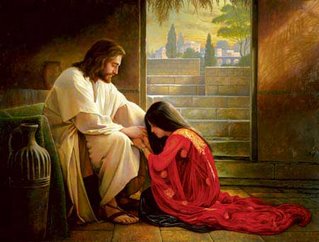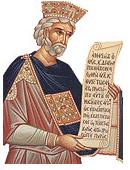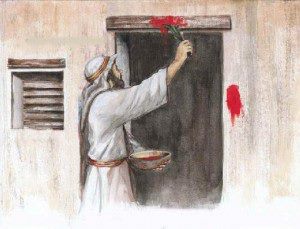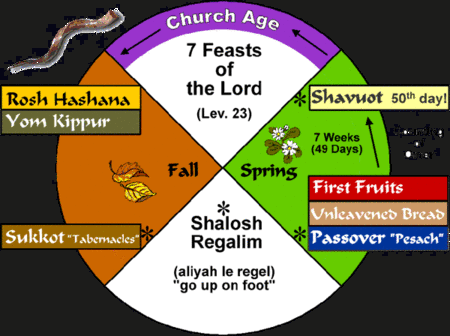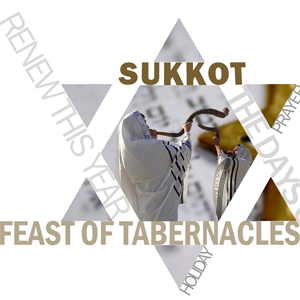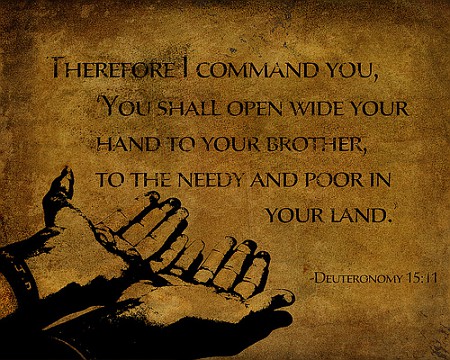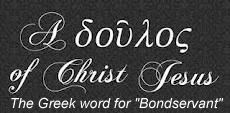| Review & Intro: In Chapter 19, we looked at the cities of refuge that the Lord told Moses to have Israel set up for the manslayer to flee to for protection from the blood avenger. We saw how this could be us needing protection from the enemy who wants to kill us for he came to kill and destroy while Jesus, our Refuge, came to give us life abundantly (John 10:10) and He is our refuge. Amen. ... In Chapter 20, the Lord is preparing them through Moses for the battles that are coming as they possess the land of promise. We are in a battle with the enemy daily and so we can learn alot from this as well for our spiritual lives. Deuteronomy Chapter 20 - Observation Questions 1. What are the Israelites "not" to be afraid of when they "see" them? vs. 1 Their enmies Just ad we are not to be afraid to stand for Christ today. 2. How can they not fear them? vs. 1 Because the Lord God was with them just as he is with us today. 3. Do you have things in your life that seem to overpower you; that are larger than life it seems? What can you do to not fear these things as well? There are so many verses we could look at, but let's look at a few and please comment on the verses below: 2 Corinthians 5:7 - Romans 4:17 - Hebrews 11:1 - Matthew 6:34 - 1 Peter 5:7 - Ephesians 6:13 - Ephesians 6:17 - Hebrews 4:12 - 2 Corinthians 10:5 - Philippians 4:6,7 - Philippians 4:8,9 - 4. Back to Deuteronomy 20. What 4 things did the priest tell the Israelite soldiers "not" to do? vs. 2,3 Faint hearted afraid Terrfied or panic 5. Who would actually fight their enemies for them and save them? vs. 4 God 6. Back to Deuteronomy 20. ... The officers spoke to the soldiers and had several groups "return home". Who needed to go back home and not to war? Comment on the verses below stating who was to leave the battleline and why. vs. 5 - anyone that is building a house vs. 6 - He that had planted a vinyard vs. 7 Any of them that were to get married 7. What did Jesus say to those who were preoccupied with other things when they also wanted to "add" Christianity to their lives? Comment on the following verse. Luke 9:23-26 - We are to daily commit our lives to the Lord daily. We sometimes just want to think of ourseves and what we want,but God says to deny ouseves this means to not worry about ouslves because God already has us in his hands. we are to do what is His will and not be ashamed of being a child of God if we are then he will be ashamed of us . Luke 9:57-62 - We have no ecuses for not following God accemted that we chose not to . Note: Following Jesus is a fulltime call to a fulltime Commander and Chief. it is a call to war against the flesh and against the powers of darkness for His kingdom sake. Are you a fulltime soldier? 8. What did Paul tell Timothy? 2 Timothy 2:3,4 - The only one that we have to please in this life is our Heavenly Father. But I am guilty of trying to please everyone but Him sometime. 2 timithy 2:3-4- Endure hardship with us like a good soldier of Christ Jesus 4 No one serving as a soldier gets involed in civilian affais-he wants to please his commanding offier. 9. What is our war with? Comment on the following verses: 2 Corinthians 10:3-5 - the unbelievers of this world 1 John 2:16 - Galatians 5:17 - Ephesians 6:12 - 1 Peter 5:8 - John 10:10 - 10. Back to Deuteronomy 20. There was another group of men who needed to get out of the battle. Explain who they were and why they should leave. vs. 8 - Afrard or fainthearted so the would not dishearting their brethen. 11. How important is it that we not make other's hearts afraid but that we give them hope and courage? very importaint How important are our words as well as our actions in helping one another stand firm in spiritual warfare? Comment on the following verses: 1 Thessalonians 5:11 - Hebrews 3:13 - Proverbs 18:21 - 12. On the other side of the coin, how are we to "help" the "fainthearted" among us in the battles of life? 1 Thessalonians 5:14 - 2 Thessalonians 2:17 - 2 Thessalonians 3:3 - Hebrews 12:12 - James 5:8 - Revelation 3:2 - Note: Have you heard that saying "One plus God is the majority"? That is true. Remember the story of Gideon? Take time to read the entire chapter of Judges 7 and encourage yourself with how God brought the army low in number so that He would have the ones that had faith and not fear to meet the enemies. What does He say in Judges 7:3 and Judges 7:7? .... Turn to 1 Samuel 14:6 and record what Jonathan told his armor bearer about the Lord and battles. ........It is not about "how many", but "how dedicated and how believing in the Lord they are" ... Amen? 13. Back to Deuteronomy 20. ... When the priest and the officers had cleared out those concerned about other matters and the ones that were "fainthearted", the ready-to-go warriors remained. Out of these, they appointed "commanders" of armies at the head of the people (vs.9) ... What was the first thing the commander was to offer a city when they approached it? vs. 10 peace 14. If the city agreed to make peace with them, they would become forced labor and serve with them. (vs.11) ... What were they to do, however, if the city refused to make peace with them, but rose up in war? vs.12 Destroy them 15. Who were they to strike in the city? vs. 13 ...The men.. Who were they to keep alive? vs. 14 .. the women and children. and ther live stock Who would the spoils and booty of the city belong to? vs. 14 They were to get it 16. This applied to all the cities that were very far from them. In regard to the 7 nations nearby that were to be taken for their possession (inheritance), they were to totally destroy them and not leave anything alive. (vs.15-18). What were the names again of these 7 nations the Lord was giving as an inheritance to the tribes of Israel? vs. 17 1) Hittites Hittites 2) Amonrites 3) Canaanites 4)Perizzites 5)Hivites 6)Jebusites 7) 17. Why were they to utterly destroy them? vs. 18 18. We have discussed alot of this before, but what were some of the things that these nations did for their gods that were so destable? Look up the names of a few of their gods in a concordance and share what worship to them was all about. 19. Back to Deuteronomy 19. What kind of trees were they not to destroy when they were besieging a city for a long time to make war against it? vs. 19 The trees that bear food 20. Which trees would be okay to cut down and use to construct siegeworks against the city they were making war with? vs. 20 The ones not for food Application: 21. Are you dealing with fear for a battle you are fighting today? Give your fear to the Lord and realize that He will fight your battle for you. What verses can you choose from today's lesson to memorize and speak when you need to overcome the fear. Please write them down. 22. What can you do to train yourself to be a more committed soldier for the Lord Jesus Christ? Think about it and try to write out your answer. 23. Summarize the lesson and post a prayer if you would like. |
| -- may God bless you. |
ecc 1-2 without God in our lives evything that we do or say is just for other after we die . I would like to leave behind something besides mony and fame . I hope that people would rember me as trying to always doing what I can to help others to Christ.
Tuesday, October 30, 2012
Deuteronomy 20
Sunday, October 28, 2012
Deuteronomy 19
|
Saturday, October 27, 2012
Deuteronomy 18
Review & Intro: Moses has been reviewing the law, the feasts, and all the things of the law that he had shared with them in Exodus, Leviticus, and Numbers before they enter the Promised Land. In Chapter 17, he explained to them what the Lord said concerning the time they would choose a king to rule over them. In Chapter 18, Moses tells them why and how they should all take care of the Levites among them. They are the ones who belong fully to the Lord for ministry and the the Lord is their only inheritance. He takes care of them through the people. The subject of witchcraft is covered as well; it is an abomination to the Lord.
Deuternonomy Chapter 18 - Observation Questions
1. The Levitical priests, the whole tribe of Levi, were to have no portion or inheritance with Israel. The Lord was to be their only inheritance. How were their needs to be met? vs.1-2
They were to be giving from tha sacfice of the people
2. What parts of each sacrifice from the people were to be given to the priest to eat? vs. 3 - Name 3
The shoulder the stomack and the cheecks.
3. Other than the meat of the sacrifices, what were the people to give to the priests? vs. 4 - Name 4 things
Thfe first fruits of their gran and their wine and theiroil and their first fruits of ther fleccesNote: The Levites who served in the tabernacle were men, and their time of service was from the age of 30 to 50 (Numbers 4:3). At the age of 50, they were to retire (Numbers 8:25). But regardless of whether they were young or old, male or female, all of the Levites were dependant upon the other tribes for support. The land they farmed was in each of the other tribes' territorites (Numbers 35:2-8). The money they received and the meat that they ate was from the offerings that the other tribes made to the Lord (Numbers18:24).
4. How are we to take care of those in the ministry today? Comment on the verses below:
- 1 Corinthians 9:13,14 -The chuch is suppost to meet their needs (the church is the men and women in the building we are the church.)
- 2 Corinthians 9:7 -We are to give from the heart and do it cheerfully and in this way help those that are preaching and teaching God's word all over the world but we also need to sart at homefront. There are people in the mountains that have not heard God's word nor the love of a christain coming and just saying hi to them or asked if they need anything.
- 1 Timothy 5:17,18 -
Note: We should be thankful for our ministers and be faithful to tithe and offerings, realizing that for things to be well organized and effective to care for the needs of the people, the staff must be paid and cared for along with all the bills to keep things operating smoothly. We should be cheerful in giving for the Lord loves a cheerful giver.
5. Back to Deuteronomy 18. In regard to the Levites and the priest that served them, the Lord had chosen him and his sons to stand and serve the Lord forever. (vs.5) ... The Levites would live in their towns, but would go to the place the Lord chose for them to serve whenever he desired along with his fellow Levites who stood before the Lord. (vs.6,7). How would their needs be met? vs. 8
Thfey would be feed by the other tribes and this was besides the offerins that the they were to recieve of the sacerficee.
6. What did the Lord want them to not learn to do when they entered the Promised land? vs. 9
Not to do that was wicked that the other nations were doing.
7. What did the Lord make clear that His people were not to be a part of in anyway? vs.10,11 - Name 9 things
Make there sons or daughter pass thought the fire.
witchcraft
soothsaying
interpet omens
confour spells
socerary
Make there sons or daughter pass thought the fire.
witchcraft
soothsaying
interpet omens
confour spells
socerary
8. What would the result be if they did these "detestable" things? vs. 12
They would be driven out fro the Lord.
They would be driven out fro the Lord.
9. The nations that they would be dispossessing were people who did practice witchcraft and these other things, but God did not allow His people to do them. How did He want His people to act? vs.13,14 -
The way God told them to in his word. Just as we are today. We are not supost to do these things either .
10. Who did the Lord promise was coming that they would be able to listen to? vs.15
The Prohet( The Lord Jesus Christ)
The Prohet( The Lord Jesus Christ)
11. What had the people asked of the Lord back when He gave the commandments to Moses on Mt. Horeb? vs. 16
They did not want to hear the Lord God voice in the mist of the fire.
They did not want to hear the Lord God voice in the mist of the fire.
12. At that time, the Lord said the people had spoken well, and that He would raise up a prophet from among their countrymen that would be like Moses. The Lord would put His words in his mouth and speak to them. (vs.17,18) ... What would happen to anyone that would not listen to God's Words through this prophet speaking for Him? vs. 19
He would require it of them.
He would require it of them.
13. Is this prophet spoken of in the New Testament? Comment on the following verses:
- John 1:19-21 ... What were the Jewish people looking for when they asked John the Baptist about his identity? vs. 21 -
- John 5:46,47 ... Who did Jesus say wrote about Him and should be believed?
- John 6:14 ... What did the men who saw the signs that Jesus performed say that He must be?
- Matthew 17:1-6 ... At the transfiguration that Peter, James, and John got to be a part of ... they saw Moses, Elijah, and Jesus in His Glory ... Who did God tell them to listen to? ...
- Acts 3:18-26 .... Who does Peter say in his sermon is the prophet that God had sent them?
- Based on these verses, who are you convinced is the prophet that God would send like Moses that would give them His Words and they would be destroyed if they did not believe Him? .....
14. A prophet that spoke a word presumptuously in God's Name what He had not commanded to speak, or one that spoke in the name of other gods, was not the true prophet and was to die. (vs.20) ... If someone wondered how they would know if the word was from the Lord, how were they to know? vs. 21,22
Application:
15. Things such as witchcraft, palm reading, astrology forecasts, and things like that are meant to seem "harmless" in our day. Do you think the Lord would want us to give attention to these kind of things? Sorcery is mentioned in the New Testament also. Comment on the following verses:
- Acts 19:18-20 - What did the Spirit's conviction lead the people to destroy? ..
- Galatians 5:19-21 - Make this list and highlightwhere sorcery is mentioned. ....What happens to those who practice these things as a habit of life? ...
- Revelation 21:7,8 - What habitual sins are listed that keep one out of heaven? ... again highlight sorcerers in the list you make
16. If you have made "light" of these things, this would be a good time to see the seriousness of them and ask the Lord to forgive you and help you turn from anything that would be considered idolatry or sorcery, etc.
17. Jesus told those in His day that if they had believed the writings of Moses, they would believe in Him because Moses wrote of Him. Jesus was the Prophet like Moses and yet Jesus is also God in the flesh. Romans says "Faith comes by hearing the Word of God", but Paul also asks "How will they hear without a preacher?" ... Read Romans 10:8-17 ... and summarize what it is saying in your own words.
18. Just like they were to support the Levites who gave their time to serving the Lord, we must support our pastors and missionaries and everyone who is sharing the Gospel with those who need to come out of darkness into God's marvelous light. What are you doing to share with them? ... to support those who are in the ministry? ... Are you giving with a cheerful heart ? Why or why not?
19. Summarize this lesson and post a prayer if you would like.
Deuteronomy 17
ew & Intro: Chapter 16 was about the 3 Feasts that Israel were to celebrate in the place that the Lord would choose for them when they were living in the Promised Land. Chapter 17 describes how the sacrifices were to be without blemish or defect. This is covered even more thouroughly in Leviticus 22. This demonstrated that God demanded holiness for the substitute in place of the sinner. When Jesus Christ was crucifed for our sins, was was holy and without sin. Peter said that we were redeemed by "the precious blood of the a lamb unblemished and spotless, the blood of Christ." (1 Peter 1:9).
Deuteronomy Chapter 17 - Observation Questions
1. What was required of the ox or the sheep that the Israelite would offer to the Lord and why? vs. 1
It had fo be pefected no spot or blimises(It could not be lame or blind or have any deases at all.
2. If there was a man or a woman in any of the towns that left the worship of the Lord on the terms that He had set in place, and they had literally gone off to serve "other gods and worshiped them" .. or had become involved in the "worship of the sun, moon, or heavenly host", it was to be investigated thoroughly. Once it was known to be an absolute fact, what was to happen to the person? vs.2-5
They were to be taken to the gate and then put to death by stoning.
3. This extreme measure was not to be taken on heresay, but on the evidence of 2 or 3 actual witnesses. A person was never to be put to death on the evidence of 1 witness. (vs.6) ...Who was to be the first to cast a stone in the person's death? vs. 7
The wittnesses were the ones that cast the first stone this can be fasted forward to the women the priest bruoght to Jesus saying that this woman was caught doing wring and by Moses' law was condommend to die. Jesus told the "he without sin cast the first stone. They all walked away because they all had sin somewere in their lives .
4. What was the purpose of this action? vs. 7
5. This makes the story of the adulterous woman in Jesus' time even more meaningful. Remember, she was caught in the "very act" and so the witnesses were there and letting Jesus know that the law of Moses should be carried out concerning her. What did Jesus say to them? He said "he among you that has 'no sin' be the 'first' to cast a stone. He bent down and began to write in the sand and most believe He was listing the commandments that all of them would have guilt in at some point as well. Let's read the story and realize more than ever that "The Law came through Moses; grace and truth came through Jesus" (John )
Amen- Read John 8:1-11
- ..... Jesus asked her .... "Where are your accusers?"
- Did Jesus condemn her? vs.11
- no
- What did He tell her? vs. 11
- niether do I go and sin no more.
- What do you think He meant by that? Could she literally never commit a sin again? no What do you think He meant in light of the sin her accusers had condemned her for?
- Remember this - The Holy Spirit convicts. It is the enemy who accuses us and condemns us. Comment on the following verses:
- Romans 8:1 -
- We were the ones on deathrow because we are the ones that are sinners but Jesus said Go free I will take your place and die in stead of you. there are no sweeters words on this earth then to know that Jesus thought God's grace saved me and took my place when I was the one that should have died. Christ
- Romans 8:34 - is the only one that has the right to condemm us God the Father gave Him that right when Jesus died for us.
- Revelation 12:10 -
- Who condemns us? .......
6. When they could not decide more difficult cases in their towns, whether ... homicide, lawsuits, or assaults ... they were to take it to the "higher" court in the place where the Lord chose to dwell with His people, where the Levitical priest or the judge in office would be in the day of their need, declaring the case to them, and they would give them the verdict of the case. (vs. 8,9) ... What were they to be sure and obey at that point? vs.10,11 -
The law of the sentesce they were not to waver away from it at all.
7. If a man acted presumptuously and did not listen to the priest serving the Lord or to the appointed judge at the time, what would happen to them and why? vs.12,13
The or women will die. They will be an way to show other not to disobey God's words.
8. What would the people begin to want after they entered the land of Promise that would make them be like all the nations around them? vs. 14
A king to be over them here on earth to tell them .
9. When they desired this, what were they to be sure to use as a measure in choosing a king to rule over them? vs. 15 - Name 2 things
1-One that the Lord God chose for them.2-Not to chose one that was not an Isrealite.
10. What were the things the king chosen over Israel was "not" to do? vs. 16 - Name 4 things he was "not" to do -
1- Not to multyply hores for himself.Not to cause them to return to Egpty.
11. What had the Lord said for the people to never do again? vs. 16
They were never to go back to egypt. The same as we are not to return to our sinfuul ways.
12. Once the king took office and was sitting on his throne of his kingdom, what was he to personally write out for himself on a scroll and in whose presence? vs. 18
God's lawsNote: Think of that when you are thinking our lessons are too long to write out (smiling)
13. The king was to keep the personally handwritten copy of the law on the scroll with him at all times. He was to read it all the days of his life. What would he learn through this and how would he learn it? vs. 19
Learn to fear God.
14. What would the "law of the Lord" help the king not to do? vs. 20 - Name 2 things
1- That his heart may not be lefted above his brethern2-That he may not turn away from the commandments.
15. What would be the result of the king obeying the law of God? vs. 20
Live a long life.
16. God had wanted to be the only king over Israel. He wanted them to have leaders as they did under Moses, but to remain dependent on Him as their king. In Judges, the people asked Gideon be their king. What did Gideon say to them at that time?
- Judges 8:22-23 -
17. During the days of the prophet Samuel, the people wanted a king appointed over them. What was their reason for this?
- 1 Samuel 8:5 -
Note: God knew this day would come, when they rebelled against His plan. So in preparation for their rebellion, He gave them standards for this king they wanted. Of course they neglected the standards as well. The first king they appointed was Saul, but God's choice for them was David, who God called "a man after His own heart."
Application:
18. We are thankful that Jesus is our unblemished and perfect sacrifice for our sins. In Him, we have the righteousness of God to appear before the throne of mercy in our times of need. Take a moment and thank the Lord for Christ, our Passover Lamb. Amen.
19. Like the woman caught in the very act of adultery, I am sure if there was a camera installed on our every thought and action in the most private places, we would stand guilty of a sin that would have been punishable by death under the law of Moses. As Christians, we have the Holy Spirit that helps us "put to death" sins in our body, but we will not suffer physical death or separation from God in the life to come if we are truly born again and have a repentant heart for our sins. Comment on the following verses:
- Romans 8:13 -
- Colossians 3:8-11 -
20. The people wanted a king to rule over them. The Lord had requirements for any king that they were to put over them. Look up the following verses and comment on how it would benefit the king to do these things and how it would help us in our personal lives as well:
- Don't multiply horses. In other words, don't depend on the horse for strength, but on the Lord. What do you think we depend on to win our battles today? Read Psalm 20:7 and comment.
- They were never to return to Egypt. This is a picture of the world for us, a place of power or security in things of the world. What did Stephen say about the historical record of Israel? Acts 7:39 -
- What do we turn to in the world today that would be not depending on the Lord?
- They were not to multiply wives or money. In other words, don't feed the lust of the flesh - immorality and greed which is idolatry. What does 1 Timothy 6:9-10 say about those who want to get rich in this life?
- They were to write out a copy of the Law and read it everyday. How does Psalm 119:9-11 say a young man can keep his way pure? What does Romans 12:1,2 tell us to do in order to always know God's good and acceptable will for our lives?
- These are safeguards for all of us to avoid the pitfalls of idolatry and immorality. What steps can you take to do this?
21. Summarize the lesson and post a prayer if you would like.
God wants us to give our very best to Him . But that is only right He gave His very best for our sins. We soometimes want want to do things halfheartly for God but If we really think about it H didn't have don't have to send His son to die for our sins. chose to do this for us a nd Jesus aacempted our sins when He was perfect and did no sin and didn't have to die for Himself.Deuteronomy 16
Review & Intro: Moses is preparing the people to go into the Promised Land, giving them reminders of commandments, ordinances, etc. Included in this must be the reminder that they have 3 feasts that the men will be required to come to at the place the Lord chooses 3 different times a year. Chapter 16 begins with the instructions for celebrating the feast of Passover in the month of Abib which was later called the month of Nisan.
1. What happened in the month of Abib that the Israelites were to celebrate every year? vs. 1 The passover that was when God brouth them out of Egpty at night. 2. Where were they to sacrifice from the flock and the herd at when they crossed over into the Promised land? vs. 2 The place the Lord would chose for them. 3. What kind of bread were they to eat with it for 7 days and what was it called? vs. 3 Bread with out yeast (unleaving bread). 4. Why was it called this and what was this to cause them to always remember? vs. 3 It had no yeast in it. Because they lefted Egtpy in haste (in a hurry) 5. There was to be "no leaven" seen with them in all their territory for 7 days. What time on the first day was the sacrifice to be offered and how long did they have to eat it? vs. 4 They were to dacrice it in the evening ans now was to remain till morning. 6. They were not allowed to sacrifice the Passover lamb in any of their towns the Lord would give them. (vs. 5) .. They were to go at the place that the Lord would choose to establish His Name. Eventually this would be in Jerusalem. (vs.6) ... Why were they to sacrifice the Passover lamb in the evening at sunset? vs. 6 This was the anavsarey of their departure from Egpty 7. Where were they to cook and eat the passover lamb? vs. 7 In the place that the Lord would chose. 8. Where were they to go the following morning? vs. 7 Return to their tents. 9. How many days were they to eat unleavened bread after the Passover meal? vs. 8 6 days 10. How were they to observe the 7th day at the end of that week? vs. 8 Hold a assembly to the Lord God. 11. We see the picture of God's plan of redemption in the observance of the feasts of Israel each year. The Lord Jesus Christ was the passover lamb for us all so that God passes over us and we escape His wrath because He sees the blood of Jesus upon our hearts and we are the righteousness of Him as we believe in His death on the cross, and His resurrection from the grave. We see that He was without sin as we look upon the "unleavened bread" and we see that we are called to live a sanctified life, free of the power of sin as we follow Him. When Jesus raised from the dead, it was the day they were celebrating first fruits, and the Scripture tells us that He is the first fruits of the dead. It's amazing. Comment on the following verses:
Seven weeks and then have the feast o weeks. 13. What were they to bring to this celebration (Feast of Weeks) that occurred 50 days after Passover/Unleavened Bread/First Fruits? vs. 10 A freewill offering. 14. How would it be determined "how much" this freewill offering would be for each? vs. 10 The blessing that the Lord gave unto them. 15. Who would be included in this celebration of the Lord's blessing at the "Feast of Weeks"? vs. 11 - Name 9 - Their sons and their daughters and their manservent and their women serverts Levites aliens the faterless and the widows 16. Where were they to go to celebrate this together? vs. 11 Thfe place that The Lord chose for them. 17. What did the Lord want them to remember as they celebrated these times? vs. 12 To remember that they were slaves in Egpty. 18. When were they to celebrate the Feast of Booths (Tabernacles) ? vs. 13 After the they gathered the harvest from the trashing floor. Note: This was in the fall months of harvest time. See the chart above.19. Who would be included in this celebration of the Lord's blessing at the "Feast of Booths (Tabernalces)"? vs. 14 - Name 9 Their sons their daughters their menservents and their women servents the fatherless and the windows. 20. How many days would they celebrate this feast? vs. 15 7 days 21. What would cause them to be altogether joyful at the time of this feast? vs. 15 Because the Lord your God will bless you. 22. What three feasts would all the males be required to appear before the Lord three times a year? vs. 16 - Name 3 the feast of unleaving bread, feast of weeks, feast of the tabernacle. 23. They were not to appear before the Lord empty-handed. What was each man to bring before the Lord? vs. 17 in the prportion that the Lord has blessed you. 24. How are we to determine what should be given today in offerings?
judges 26. How was justice to be served? vs. 18,19 fairly they were not to play favoites or take bribes 27. What does taking a bribe do to the eyes of the wise and the words of the righteous? vs. 19 blind them 28. What would cause them to continue to live and possess the land the Lord was giving to them? vs. 20 follow these judgment 29. What were they to be sure that they did not plant for themselves? vs. 21 An asherah pole 30. What were they not to set up for themselves and why? vs. 22 A saccret stone God hates these things.
31. How is giving freewill offerings a way to express worship to the Lord? They were not to forget to take care of the Levites (ministers), the widows, the orphans, etc. They were to come to the place the Lord designated to show public praise for all the blessing He had given them. How do we do this today? If you are not doing this currently, what steps can you take to become more disciplined in this much needed affirmation of showing the Lord and others what He has done for you?
32. What things should we not neglect to do? Comment on the verses below:
33. How should we give our offerings to the Lord? Comment on the verses below:
34. Summarize this lesson and post a prayer if you would like.
|
Tuesday, October 23, 2012
deuteronomy 15
Review & Intro: In the last chapters, we have seen Moses reviewing the Law for the people of Israel before they enter the land of Promise. In most cases, he has been giving an abbreviated form of the original time he delivered these things to them. However, as we begin chapter 15, he is actually giving more detail about the Sabbath Year than we received earlier in Exodus and Leviticus. What more do we learn?
Deuteronomy Chapter 15 - Observation Questions
1. What were they to grant at the end of every 7 years? vs. 1
Cancal all debts
2. What was every creditor to release at the end of every 7 years? vs. 2
Every loan
3. Who was this specifically in regard to? vs. 2,3 he has giving to a fellow Isreallite and brothers.
But if it is a foriner he then you can require payment from.
But if it is a foriner he then you can require payment from.
4. Take a moment to review what God had told them about every 7th year. Other than releasing the debts of all the brethren, what else was to happen to the land every 7 years and how were they to eat during those years? Read and comment with a summary of the following review:
- Exodus 23:10-11 -They were not to plant in the fields on the seventh year but let the poor use it.
- Leviticus 25:2-7 -
5. If Israel was obedient to the voice of the Lord in observing His commandments, what should not be among them because of the blessings He would bring to them in the land they would inherit? vs. 4,5
No poor.
6. What was the specific blessing coming to them if they would obey the Lord? ... Fill in the blanks from verse 6. ... "For the Lord your God will bless you as He has promised you, and you will _lend____ to many nations, but you will not __borrow from none_____, and you will __rule____ over many nations, but they will not ____rule__ over you."
7. What attitude (the heart) and action (the deed) was to be given toward any poor person in any of the towns they would be living? vs. 7, 8
Be not selfish toward them but kind and willing to help them.
8. How does this compare to what we have been told in the New Testament regarding the poor or needy among us? Comment on the verses below:
- Don't do it just so that others can see what you are doing. God loves everyone the same and when we help others we are also helping God drwa them unto him. We as humans want to tell everything that we do for other we want a pat onthe back oh what agood jovb you are doing but all that we have comes for m God anyway so he is the one that should get the honor and glory not us.
- Romans 15:26 -26For it hath pleased them of Macedonia and Achaia to make a certain contribution for the poor saints which are at Jerusalem.
- 2 Corinthians 8:13,14 - 13For I mean not that other men be eased, and ye burdened: 14But by an equality, that now at this time your abundance may be a supply for their want, that their abundance also may be a supply for your want: that there may be equalityIt all belongs to God he gave itto us to use for him. We want to keep it for ourselves but that is not what God intended for us to do with it. He supples oru needs and then gives us more then we need to help others.
- Galatians 2:10 -
- James 2:1-6 -
- James 2:16 -
9. Back to Deuteronomy 15. In regard to helping the poor, what was the temptation that they were to avoid in their towns as it got close to the 7th year of release of debt? vs. 8
10. If they did not take care of the poor for any reason, and the poor person cried out to the Lord in their need, what would it be in the eyes of the Lord against them? vs. 9
11. What would the Lord do for them if they were always generous to the poor and their heart was not grieved in giving to them in this manner? vs. 10
12. What is a fact concerning the poor then and now? Comment on the two verses below:
- Deuteronomy 15:11 -There would always be poor amoung them and that with a glad heart they should help them.
- Matthew 26:11 -That we would have the poor with us always but the ones s that were with Jesus at that time would not have HIm humamly with them always. We have him with us as christain sptitural but the lost do not and that coud be away to help them if they are in need and we help them we could say don't thank me thank God He is ther one that gave it to me .
13. Back to Deuteronomy 15. When a person could not pay back a debt, they mortgaged themselves to serve the creditor as a type of slave to them to pay them back with service rather than goods. They could serve no longer them 6 years. What was the creditor to do every 7 years in the Sabbath Year that God declared? vs. 12
Let them go free.
14. When a kinsman was set free from serving, what was he to be supplied with as well? vs.13 - Name 3 things that were to be given to him liberally -
From you flock from your granfloor and from your winepress.
15. What were they to remember that would help them let go of the service every 7th year? vs. 15
They were to rember that they were slaves themselves in Egypt.
16. Sometimes a person would not want to be set free from their service to a kinsman. During their time of service, they had been treated well and truly loved being a part of their family so to speak. If they did not want to be set free, they became a bondslave to them; a slave to them "by choice". (vs.16) ... How would that slave (male or female) be marked to show that he/she wanted to belong to a particular service? vs.17
Put a awl thur his earlobe at the gate.
17. How does this help you understand Paul and others calling themselves a bondservant of the Lord Jesus Christ, as well as Paul saying that he had the brandmark of belonging to Jesus? Comment on the following verses:
- Acts 4:29 -
- Romans 1:1 -
- 2 Corinthians 4:5 -
- Galatians 1:10 -
- Galatians 6:17 -
- Philippians 1:1 -
- Colossians 1:7 -
- Colossians 4:7 -
- Titus 1:1 -
- James 1:1 -
- 2 Peter 1:1 -
- Jude 1:1 -
- Revelation 1:1 -
- Revelation 2:20 -
18. Paul said that Jesus was a bond-servant of God the Father. What should this mean to us? Comment on the following verse:
- Philippians 2:7 -
19. Do you consider yourself a "bond-servant" of the Lord Jesus Christ? How should a bond-servant of Jesus conduct themselves to others and why? Comment on the verse below:
- 2 Timothy 2:24 -
20. It is a matter of choosing who we will serve. We had someone tell us we were brain washed and our answer was "We all are, but we have chosen Who we want to wash our brains". .... Jesus said we will either serve God or mammon (material things). When we choose to serve Jesus, we are choosing not to serve our own lusts, our own worldly cravings, and the temptations of the evil one. Comment on the following verses:
- Romans 6:17-23 -
- Romans 6:22 (specifically) -
Note: These men came to the realization that it's better to be enslaved to God for life than enslaved to sin, which results in death. What do you think?
21. Back to Deuteronomy 15. Why should a person not mind setting the other one free after the 6 years of service to them? vs. 18
It would have cost him more for a haired hand and God would bless + him.
22. What were the Israelites always to consecrate to the Lord? vs. 19
firstborn of their herds.
23. What were they not to do with the firstborn of their herd each year? vs. 19
Not to put them to work.
24. What were they not to do with the firstborn of their flock? vs. 19
Shear them
Shear them
25. What were they to do each year with these firstborn animals? vs. 20
eat them in the prestent of the Lord at the place he choosen.
26. Where were they to do this? vs. 20t the place he choosen.
27. If the animal had any kind of defect (such as being lame or blind), they were not to sacrifice it to the Lord. (vs.21) They could, however, eat it still, like they would a gazelle or a deer. (vs.22) ... As always instructed, what was to be done with the blood of the animal? vs. 23 poured out
Application:
28. Being free with our money is closely related to being free with forgiving others of the sins they have committed against us. Remember the parable Jesus told about the man who was forgiven his debt, but would not forgive another indebted to him? Read the parable and then comment on the questions given.
- Read Matthew 18:21-25
- ..... Peter wanted to know how many times he would need to forgive his brother that sinned against him. What did Jesus tell him? ..... vs. 21,22
- ..... Jesus told a parable to illustrate this of a king who wanted to settle accounts with his slaves. ... One who owed him 10,000 talents was brought to him ... He did not have the means to repay and was going to have to be sold along with his wife and children for repayment to be made .... He fell to the ground and pleaded with the king. What did the slave tell him concerning the debt owed? vs. 26 ..... What did the king feel toward the man and decide to do for him? vs. 27
- ...... That slave turned around after being fully forgiven and found a fellow-slave that owed him some money. How did he treat the one who owed him? vs. 28 ..... That person asked for patience and time to repay as well. Did this forgiven man forgive the one needing him to do the same for him? vs. 30 .....How did the king deal with him when he found this out? vs.32-34
- ....... How does this compare to our unforgiveness of others according to Jesus? vs. 35
29. Freely we have received forgiveness of the debt we owed to God for our sins. Do we ever have the right to withhold forgiveness to another for whatever they have done to us? What does unforgiveness do to our hearts and how does it effect our relationship to God and others?
29. This chapter has been about having a free and joyful and thankful heart. We should remember that God set us free from slavery and set others free. We should remember how God has blessed us and bless others in need. When others borrow, give freely and expect nothing in return. (Jesus taught this in Luke 6:31-36)....Are you holding someone hostage to a debt they owe you, whether financially or spiritually? What would Jesus have you do according to all we have learned in today's lesson? Please share from your heart.
30. Summarize the lesson and post a prayer if you would like.
Subscribe to:
Comments (Atom)
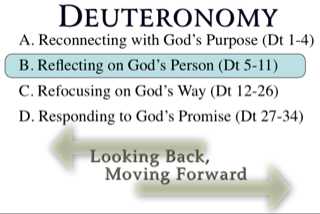

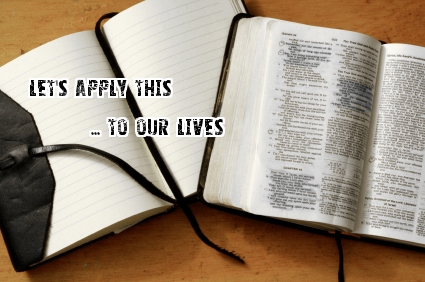
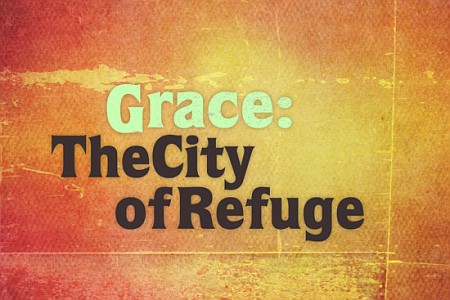
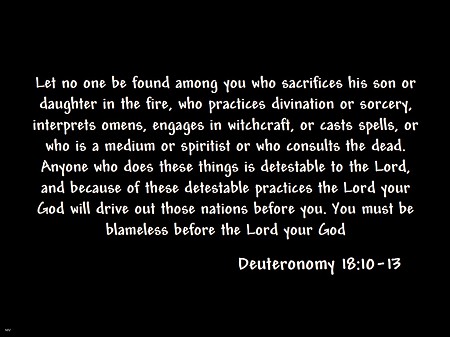
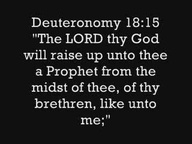
![altar of burnt offering[7] altar of burnt offering[7]](http://images58.fotki.com/v511/photos/9/513379/9447502/altar_of_burnt_offering7-vi.jpg)
